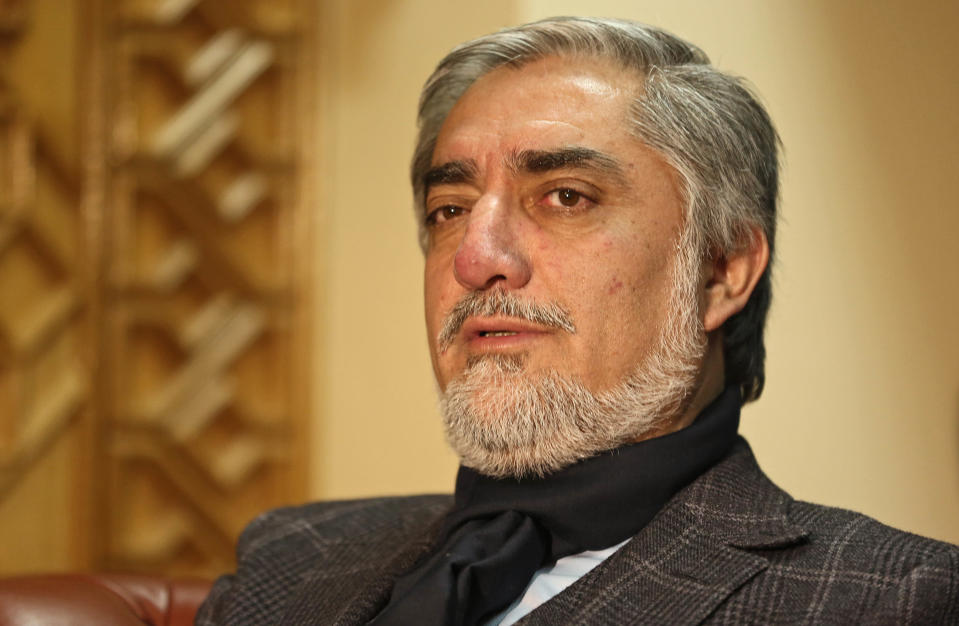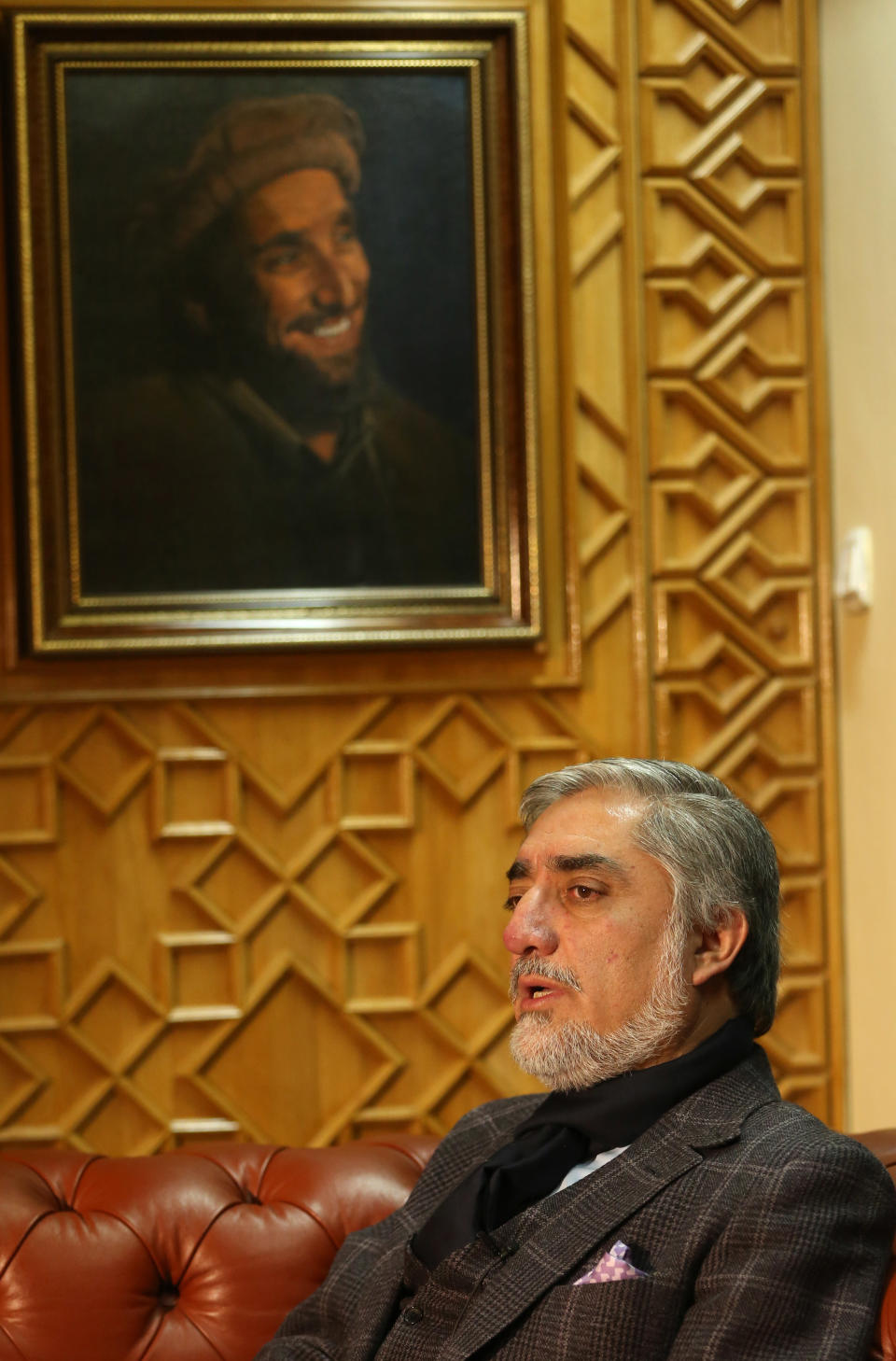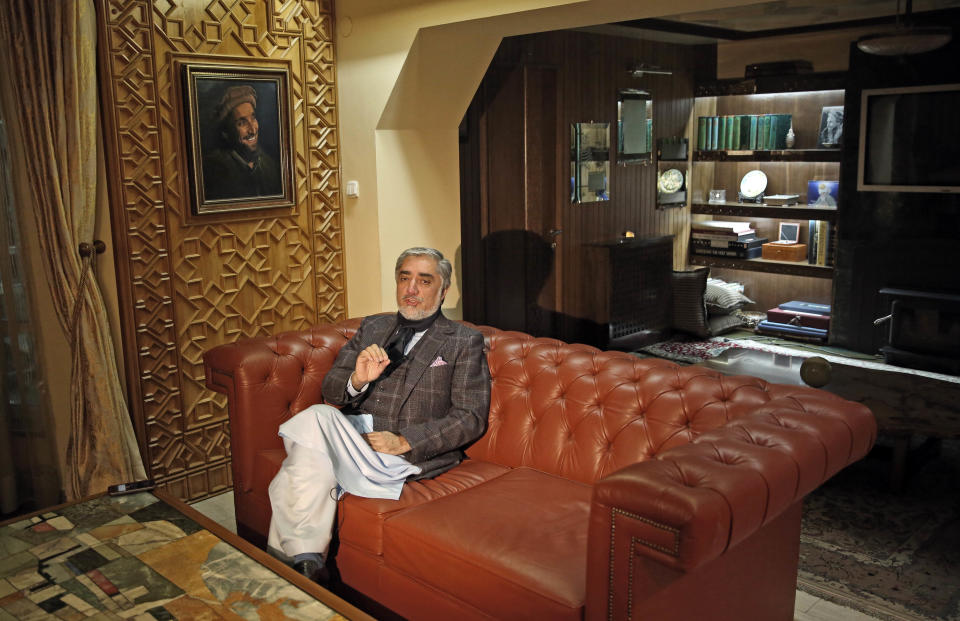AP Interview: Afghan candidate vows better US ties
KABUL, Afghanistan (AP) — Abdullah Abdullah, a front-runner in April's presidential race in Afghanistan, vowed Thursday to sign a security agreement with the United States within a month if he wins, echoing widespread Afghan fears that security will deteriorate even further if all international forces leave the country at the end of this year.
Abdullah, who was runner-up in the disputed 2009 election, criticized President Hamid Karzai for refusing sign the deal that would allow the U.S. and its allies to keep thousands of troops in Afghanistan after ending their 13-year combat mission.
He told The Associated Press that international assistance is still needed to promote security and stability in Afghanistan.
"We think and we believe that we have not reached a point where we can do it ourselves," he said during an interview at his heavily guarded home in Kabul. "We need to sign it in order to ... reach the point where Afghanistan can stand on its own feet in terms of security, to speed up that phase rather than creating a halt in between which is what's happening today."
When asked how long it would take to sign the agreement if he is named president, he said: "I think that maximum it has to be signed within a month."
The issue has been a major thorn in troubled relations between Karzai and the U.S., with major security concerns and billions of dollars in aid money at stake.
The top U.S. commander in Afghanistan, Gen. Joseph Dunford, told a Senate committee Wednesday that he would feel comfortable with having 8,000 and 12,000 troops to assist, train and advise Afghan troops if the government signs the new agreement. He warned the risk was high that Afghan security forces would deteriorate and al-Qaida could regroup without a post-2014 residual force.
The two countries agreed to a deal last year after months of negotiations, but the mercurial Afghan leader surprised the Americans by refusing to sign it and ignored the recommendations of a council of more than 2,500 Afghan elders to do so.
With many Afghans increasingly worried about a future without international support, other candidates have professed support for the agreement, but Abdullah is the only one so far to give a public timeframe to sign it.
He also said he would "keep the door open for negotiations with the Taliban," which have sputtered under Karzai, but he stressed the need to protect the people "against those who are not entering the talks." The Taliban have threatened voters and vowed violence to disrupt the vote, which they called an American conspiracy.
Abdullah, 53, looked tired and somber after days of mourning his friend, Vice President Mohammad Qasim Fahim, who died Sunday. Fahim, a key political player who held the rank of field marshal, supported Abdullah's campaign.
Abdullah enjoys a strong advantage in name recognition and political organization and is considered one of three main contenders. The others are Ashraf Ghani Ahmadzai, who chairs a commission overseeing the transition of security responsibilities from NATO to Afghan forces; and Zalmai Rassoul, who has been a national security adviser and is seen as close to Karzai.
There are seven other candidates after Karzai's brother Qayyum dropped out of the race and threw his support behind Rassoul. With the field divided, a runoff vote is widely expected.
Abdullah — who is half Pashtun and half Tajik — was a close aide to the late Ahmad Shah Masood, the Northern Alliance rebel commander who was killed in an al-Qaida suicide bombing two days before the Sept. 11, 2001, attacks. He has a strong following among ethnic Tajiks but has sought to broaden his support base by choosing a well-known leader of the minority ethnic Hazara group and a Pashtun leader of the powerful Hezb-i-Islami group as vice presidential candidates.
Abdullah, who in 2009 dropped out just ahead of a runoff vote following allegations of massive vote-rigging in the first round, said he is worried that history will repeat itself. Many Afghans and international officials believe fraud is inevitable in a murky political field dominated by patronage and shifting alliances and say the question is whether it will be rampant enough to affect the outcome.
Campaign posters are plastered across Kabul, but experts say the race will be won based on alliances as tribal and ethnic ties run deep in Afghanistan, a combustible mix of majority Pashtuns with strongholds in the south and Tajiks, Hazaras and Uzbeks who live predominantly in central and northern Afghanistan.
Martine van Bijlert, co-director of the independent research group Afghanistan Analysts Network, said Rassoul is "presenting a ticket of continuity" because of his implied support from Karzai.
"Abdullah's very much seen as a northern candidate and he is sort of seen as part of the old generation of politicians. He's always presented himself as the opposition, so both he and Ashraf Ghani are in a way vying for the position of opposition," she said.
___
Kim Gamel can be followed on Twitter at www.twitter.com/kimgamel .

 Yahoo News
Yahoo News 



